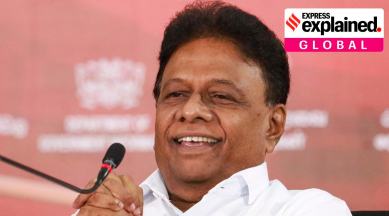Explained: Who is Dullas Alahapperuma, the Rajapaksas’ critic who lost out in the race to be Sri Lanka President?
Dullas Alahapperuma was an old Rajapaksa family loyalist who turned dissident as the protests grew. Other than being a loyal follower of the Rajapaksas, Alahapperuma was never seen as leader material earlier

Sri Lanka’s Acting President Ranil Wickremesinghe was confirmed as the successor to Gotabaya Rajapaksa by the country’s Parliament on Wednesday (July 20). Wickremesinghe got 134 of the 223 votes that were cast, and comfortably defeated Dullas Alahapperuma, who got 82 votes.
While Wickremesinghe is a familiar figure in India and around the world — beginning 1993, he had been Prime Minister on five occasions before becoming Acting President under the provisions of Sri Lanka’s Constitution after Gotabaya fled the country and resigned — Alahapperuma is comparatively lesser known.
monthly limit of free stories.
with an Express account.
Alahapperuma is an old Rajapaksa family loyalist who turned dissident in the Sri Lanka Podujana Peramuna (SLPP), the Rajapaksas’ political party.
Dullas Alahapperuma: A journalist who became politician
In 1994, Alahapperuma, who is now 63, left a career in Sinhala journalism to become a full-time politician in the Sri Lanka Freedom Party (SLFP), then led by former President Chandrika Bandaranaike Kumaratunga.
He built his political base in Matara in southern Sri Lanka, the seat that sent him to Parliament for the first time in 1994 and continuously thereafter — other than the one election in 2001, which Alahapperuma did not contest.
He remained politically close to the Rajapaksa family, and managed to retain the Matara seat even in the 2015 parliamentary election despite the split in the SLFP and the defeat of Mahinda Rajapaksa in both the presidential and the parliamentary election.
Alahapperuma stayed in the Mahinda faction of the SLFP, which eventually morphed into the SLPP. Other than being a loyal follower of the Rajapaksas, Alahapperuma was never seen as leader material before this week.
At the centre of an India-Sri Lanka spat
Less than a year ago, Alahapperuma was at the centre of a three-way spat between his government (then led by the Rajapaksa brothers as President and Prime Minister), India, and China over the award of a renewable energy project in three islands off Jaffna — Neduntheevu (Delft), Nainativu, and Analativu — close to the Tamil Nadu coast.
Alahapperuma was the Power and Energy Minister in January 2021, when Sri Lanka awarded the US $12 million project to the China’s Sinosar-Etechwin in a joint venture with the state-owned Ceylon Electricity Board as part of the Sri Lankan government’s Supporting Electricity Supply Reliability Improvement Project.
New Delhi learnt of this project just three days before Sri Lanka pulled out unilaterally from another agreement to develop the East Container Terminal jointly with India and Japan. Together, both developments set back India-Sri Lanka ties at the time.
After protests from India citing security concerns — the largest of the three islands, Delft, is barely 45 km from the coast of Tamil Nadu — Colombo kept the contract in abeyance as it considered an offer from India for a similar project, but with a grant.
The project on the islands was eventually awarded to India in March this year. Since last October, Sri Lanka has also signed agreements with private player Adani and the PSU NTPC Ltd.
From Govt spokesperson to SLPP rebel
In a cabinet reshuffle in August last year, as then President Gotabaya Rajapaksa began his first serious efforts to look for financial assistance and appointed Basil Rajapaksa Finance Minister, Alahaperuma was moved from the Power Ministry and made Minister of Mass Media. In this role, he functioned as the spokesperson for the government until March 2022, when he resigned along with all other Cabinet Ministers.
This was the time when the anti-Rajapaksa protests were picking up pace. Getting the Cabinet to resign was a desperate gamble by Gotabaya to placate the protesters, but it did not work. The government had appeared to lose majority, as several parliamentarians within the ruling SLPP-led coalition, including 11 from the SLPP itself, declared they would “sit independently” in the House.
Alahaperuma, who had been a Rajapaksa protege for most of his political career and was elected in 2019 on a SLPP ticket, became part of this 42-strong group. His rebellion against the Rajapakasas was a bit of a surprise, as much as Maithripala Sirisena’s 2015 challenge to Mahinda Rajapaksa.